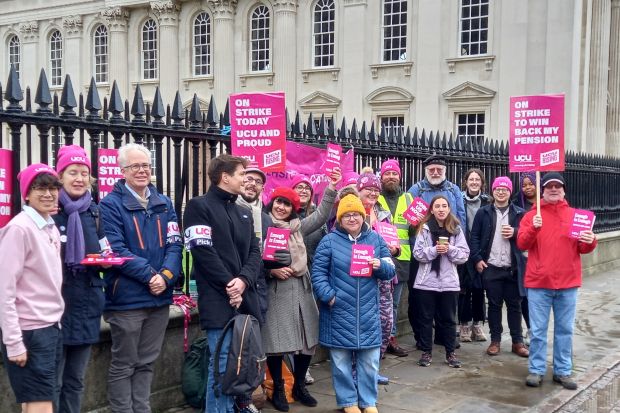The University of Cambridge’s vice-chancellor and the local lead for the University and College Union (UCU) have called for all sides to resume national talks on pay and conditions to prevent a marking boycott harming students.
Vice-chancellor Anthony Freeling and UCU branch president Michael Abberton said the boycott, which began on 20 April, would have a “significant impact” on students at what was already a “stressful and anxious time”.
“This cohort of students have already been hit especially hard by the pandemic; now, many are facing the likelihood that the completion of their degrees and their graduation may be delayed,” said Dr Freeling and Dr Abberton, adding that the boycott could bar foreign students from applying for post-study work visas.
They said both sides should return to the negotiating table “urgently, for the sake of our students, staff and members”.
Responding to the call, the chief executive of the Universities and Colleges Employers Association (Ucea), Raj Jethwa, said that “the ball is in UCU’s court” and he was “sat at the negotiating table” waiting to resume.
On the other side, UCU general secretary Jo Grady said other Ucea members should “follow Cambridge’s lead” and call for the body to come back to the table.
Staff at Cambridge recently sought to introduce “exceptional” measures to ensure students were awarded degrees on time despite the boycott, but a vote at the university's governing body rejected the changes.
Pressure has been building on the two sides as the boycott threatens to boil over at other universities as well. Students at the University of Edinburgh attracted media attention earlier this month after saying they were worried their 10,000-word dissertations would not count towards their overall degrees.
The union said its members across 145 universities were currently part of the boycott, with Dr Grady adding that the joint statement was a “hugely significant moment” for ending the ongoing impasse.
Mr Jethwa denied UCU’s claim that Ucea had withdrawn from negotiations, but said it would only participate if all industrial action was paused.
“I would reiterate that, if the marking and assessment boycott is called off, Ucea retains its strong desire to begin constructive dialogue with the trade unions,” Mr Jethwa wrote on 11 May.
Cambridge only moved to recognise the union in March, a decision that brought it in line with the vast majority of other universities in the UK. Some had previously opposed recognition because staff are represented in internal committees.
“No-one wants students to suffer further, and we are deeply sympathetic to the strength of feeling in our student body,” said Dr Freeling and Dr Abberton in their statement. “For many, including staff, this is a stressful and anxious time.”

